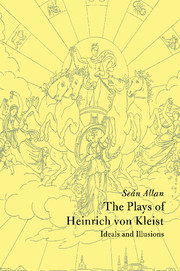Book contents
- Frontmatter
- Contents
- Preface
- A note on the translations
- Abbreviations
- Chronology of Kleist's life and works
- Dedication
- 1 Introduction
- I THE YOUNG KLEIST
- II VIRTUE ASSAILED
- III FICTIONS OF FEMININITY
- 6 Penthesilea
- 7 Das Käthchen von Heilbronn
- IV KLEIST AND THE NATIONAL QUESTION
- Notes
- Select bibliography
- Index
6 - Penthesilea
Published online by Cambridge University Press: 28 August 2009
- Frontmatter
- Contents
- Preface
- A note on the translations
- Abbreviations
- Chronology of Kleist's life and works
- Dedication
- 1 Introduction
- I THE YOUNG KLEIST
- II VIRTUE ASSAILED
- III FICTIONS OF FEMININITY
- 6 Penthesilea
- 7 Das Käthchen von Heilbronn
- IV KLEIST AND THE NATIONAL QUESTION
- Notes
- Select bibliography
- Index
Summary
Even the most cursory examination of Kleist's correspondence will reveal the important role women played in his life, for the vast bulk of his correspondence is addressed either to his sister, Ulrike von Kleist, or to his fiancée, Wilhelmine von Zenge. In addition, his letters to his cousin, Marie von Kleist, most of which were written towards the end of his life, bear witness to the closeness of their relationship. It should come as no surprise, therefore, that women feature so prominently in his literary works. Kleist realised that women, by virtue of their marginalised position in the predominantly patriarchal culture of his day, were, for the most part, shielded from some of the more pernicious effects of social ideology. And although few of Kleist's characters display no trace of their upbringing in conventional society, more often than not, his female characters have a surer grip on reality than their men folk. For example, Eve, in Der zerbrochne Krug, is able to see beyond the prevailing conventions of her society and grasp the reality of her situation precisely because she is marginalised by that culture for being ‘just a woman’, young, and coming from a lowly peasant family. Alkmene, on the other hand, although she has the ‘advantages’ of youth and gender, is of noble birth and, as a result, is more thoroughly marked by the conventions of her male-oriented society than Eve is by hers. But despite the difficulties that result from her uncritical acceptance of the misguided notion of ‘feminine virtue’ enshrined in the conventions of Theban society, she is far more likely to recognise her mistake than her ‘suitors’, Jupiter and Amphitryon, are to recognise theirs.
- Type
- Chapter
- Information
- The Plays of Heinrich von KleistIdeals and Illusions, pp. 141 - 177Publisher: Cambridge University PressPrint publication year: 1996

